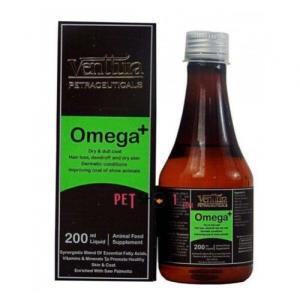Table of Contents
Omega Plus syrup is a harmonious fusion of vital vitamins, zinc, essential fatty acids, and inositol, specially formulated to enhance skin and coat health. Enriched with saw palmetto, this syrup is recommended for addressing non-specific alopecia and dermatological concerns, enhancing the coats of show animals, as well as managing both external and internal inflammation.

What Is Omega Plus Supplement?
Is your furry friend suffering from a dry or dull coat? They may be battling dry skin, dandruff, or even hair loss. Omega Plus supplement could be the key to addressing these issues and more.
Omega Plus is specially formulated to provide essential fatty acids, vitamins, and minerals that promote healthy skin and a lustrous coat. It’s not just about appearances, though – this supplement can also aid in managing non-specific alopecia and different dermatological conditions and even improve the coats of animals.
But that’s not all – Omega Plus goes the extra mile. It can help combat external and internal inflammation, making it a valuable addition for pets dealing with arthritis, allergies, and even autoimmune disorders.
Give your pet the gift of well-being with Omega Plus – because a happy, healthy pet shines from the inside out.
Ingredients
Per milliliter, the composition includes:
- Soybean Oil: 868 mg;
- Eicosapentaenoic Acid: 6.6 mg;
- Zinc Sulphate: 6.1 mg;
- Saw Palmetto: 5 mg;
- Docosahexaenoic Acid: 4.4 mg;
- Gamma Linolenic Acid: 1.34 mg;
- Inositol: 0.33 mg;
- Pyridoxine Hydrochloride: 0.1 mg;
- Biotin: 100 mcg;
- Retinol Concentrate: 112.7 IU;
- Alpha-Tocopheryl Acetate: 1.86 IU.
Dosage
|
Animal Type |
Weight Range |
Dosage (ml) |
|
Cats |
All Weights |
5 ml |
|
Dogs |
< 10 Kgs |
5 ml |
|
10-20 Kgs |
10 ml |
|
|
> 20 Kgs |
15 ml |
|
|
Horses |
< 10 Kgs |
5 ml |
|
10-20 Kgs |
10 ml |
|
|
> 20 Kgs |
15 ml |
|
|
Farm Animals |
< 10 Kgs |
5 ml |
|
10-20 Kgs |
10 ml |
|
|
> 20 Kgs |
15 ml |
Administer the recommended daily dose either directly or by mixing it with food.
Important Safety Information for Pet Owners
Before starting any new supplement regimen, consult your veterinarian to ensure Omega Plus suits your pet’s needs and health conditions.
Administer the correct dosage based on your pet’s weight and follow the provided guidelines diligently. Avoid exceeding the recommended dosage, as excessive intake can lead to adverse effects. Keep a close eye on your pet for unusual reactions or side effects. If you notice any adverse reactions, discontinue use and contact your veterinarian immediately. Check the ingredients carefully for any known allergies your pet may have. If your pet is allergic to any component of Omega Plus, do not use it.
If your pet is on other medications or supplements, consult your veterinarian to ensure there are no potential interactions with Omega Plus. If your pet is pregnant, nursing, or has underlying health conditions, consult your veterinarian before using Omega Plus.
Omega Plus is a supplement and should not be used as a substitute for a balanced diet. Ensure your pet receives proper nutrition alongside supplementation.
If your veterinarian recommends discontinuing Omega Plus for any reason, do so under their guidance.
If your pet experiences any unexpected side effects or health issues while using Omega Plus, report them to your veterinarian and the manufacturer.
Veterinary Prescription
Omega Plus supplement for pets is available over-the-counter and does not require a veterinary prescription for purchase. However, regulations and requirements for pet supplements can vary by region and may change over time.
We recommend contacting your local veterinary clinic or pet supply store or checking the product’s official website to ensure the most accurate and up-to-date information regarding Omega Plus or any other pet supplement purchase. They can provide you with information specific to your location and the current regulations.
Interactions
Omega Plus supplements, which typically contain essential fatty acids, vitamins, and minerals, are generally considered safe when used as directed. However, it’s essential to be aware of potential interactions with other medications or supplements that your pet may be taking. Here are some common interactions and precautions to consider:
- Blood Thinners: Omega-3 fatty acids, such as those found in Omega Plus, may have mild blood-thinning effects. If your pet is already on blood-thinning medications, consult your veterinarian before adding Omega Plus to their regimen to avoid excessive bleeding risks.
- Anti-Inflammatory Drugs: Omega-3 fatty acids may have mild anti-inflammatory properties. If your pet is taking prescription anti-inflammatory medications, discuss the use of Omega Plus with your veterinarian, as it could enhance the anti-inflammatory effects.
- Supplement Interactions: Be cautious about giving multiple supplements simultaneously. Some supplements can interact with each other, leading to imbalances or reduced effectiveness. It’s best to consult your veterinarian to ensure that the combination of supplements, including Omega Plus, is safe and beneficial for your pet.
- Allergies: Check the ingredients of Omega Plus for potential allergens. If your pet is known to have allergies to any of the components in the supplement, do not use it.
- Prescription Medications: If your pet is on prescription medications, consult your veterinarian to ensure that there are no known interactions between those medications and the ingredients in Omega Plus.
- Health Conditions: If your pet has any underlying health conditions, such as liver disease, kidney disease, or a bleeding disorder, consult your veterinarian before using Omega Plus, as these conditions may affect how the supplement is metabolized and utilized by the body.
- Pregnancy and Nursing: If your pet is pregnant or nursing, consult your veterinarian before starting any new supplement, including Omega Plus, as special considerations may apply.
Maintaining open communication with your veterinarian when considering any dietary supplements for your pet is essential. Always follow their recommendations and dosage instructions for the best results and to minimize potential interactions or adverse effects.
Side Effects
Omega Plus supplement is generally considered safe when used as directed. However, like any supplement or medication, there can be potential side effects, although they are typically rare and mild. Here are some possible side effects to be aware of:
- Gastrointestinal Upset: In some cases, pets may experience mild gastrointestinal issues such as diarrhea, vomiting, or soft stools. This can often be avoided by administering the supplement with food or adjusting the dosage. If these symptoms persist or worsen, consult your veterinarian.
- Allergic Reactions: While uncommon, some pets may have allergies or sensitivities to specific ingredients in Omega Plus supplements. Signs of an allergic reaction can include itching, skin rash, hives, swelling, or difficulty breathing. If you suspect an allergic reaction, discontinue use and contact your veterinarian immediately.
- Bleeding Disorders: Omega-3 fatty acids in these supplements may have mild blood-thinning effects. This could lead to bleeding issues in rare cases, especially if your pet is already prone to bleeding disorders. If your pet has a bleeding disorder or is on blood-thinning medications, consult your veterinarian before using Omega Plus.
- Weight Gain: Some Omega Plus supplements may have added calories, which could lead to weight gain if not accounted for in your pet’s diet. Monitor your pet’s weight while using the supplement, and adjust their overall calorie intake if needed.
- Interactions: As mentioned in a previous response, Omega Plus can interact with certain medications, especially those related to blood clotting and inflammation. Consult your veterinarian if your pet is on any prescription medications.
It’s important to remember that these side effects are rare, and many pets tolerate Omega Plus supplements without issues.
Overdose
Like any supplement or medication, the Omega Plus supplement should be used responsibly to avoid overdose. Overdosing on Omega Plus can potentially lead to adverse effects. Here are some considerations to prevent an overdose:
Always administer Omega Plus according to the recommended dosage instructions provided by your veterinarian or on the product label. Do not exceed the specified dosage. Ensure that the dosage is appropriate for your pet’s weight.
Be cautious about giving multiple supplements simultaneously, as this can increase the risk of overdosing on specific vitamins or minerals. If your pet already receives other dietary supplements or medications, discuss their compatibility with Omega Plus with your veterinarian.
Keep an eye on your pet for any signs of overdose, which can vary depending on the specific ingredients in the supplement. Symptoms may include gastrointestinal distress (vomiting, diarrhea), excessive thirst and urination, lethargy, or other unusual behavior. If you suspect an overdose, contact your veterinarian immediately.
If you believe your pet has ingested an excessive amount of Omega Plus or is experiencing severe symptoms, seek emergency veterinary care without delay.
Omega Plus supplement is generally well-tolerated when used correctly and within recommended guidelines. However, responsible use and close monitoring of your pet are crucial to ensuring their safety and well-being.
Storage
Store the Omega Plus supplement in a cool, dry place away from direct sunlight and heat sources. Heat and humidity can lead to the degradation of the active ingredients. Ensure the container or bottle is tightly closed after each use. This helps prevent moisture and air from entering, which can cause the supplements to deteriorate.
Omega Plus supplements are sensitive to oxygen, which can lead to oxidation and a decrease in potency. Choose a container that minimizes air exposure, such as one with an airtight seal.
Store the supplements in an inaccessible location for pets and children to prevent accidental ingestion.
Check the expiration date on the product label and adhere to it. Expired supplements may lose their potency or effectiveness and should not be used.
While not always necessary, refrigeration can benefit certain Omega Plus supplements, especially those containing fish oil or other sensitive ingredients. Refrigeration can slow down the oxidation process and extend the shelf life. However, ensure the supplement is well-sealed to prevent moisture from getting in.
Some Omega Plus supplements may have specific storage recommendations provided by the manufacturer. Always read and follow any storage instructions included with the product.
FAQ
How does Omega Plus benefit my pet’s health?
Omega Plus can support your pet’s skin and coat health, promote joint health, manage inflammation, and provide essential nutrients for overall well-being.
Is Omega Plus suitable for all types of pets?
Omega Plus is generally suitable for dogs, cats, horses, and some farm animals. Always check the specific product label for recommended usage and species.
How should I administer Omega Plus to my pet?
Omega Plus is typically given orally, either directly into your pet’s mouth or mixed with their food. Follow the dosage instructions provided on the product label or as directed by your veterinarian.
Can my pet overdose on Omega Plus?
While Omega Plus is generally safe, overdosing can lead to adverse effects. Always follow the recommended dosage guidelines and consult your veterinarian if you have concerns.
Can Omega Plus interact with other medications or supplements my pet is taking?
Omega Plus can interact with certain medications, especially those related to blood clotting and inflammation. Consult your veterinarian if your pet is on other medications to ensure compatibility.
When should I consult my veterinarian about Omega Plus?
You should consult your veterinarian before starting any new supplement regimen, especially if your pet has specific health conditions or is taking other medications. Regular check-ups and discussions with your vet can help ensure the best use of Omega Plus for your pet’s health.

































